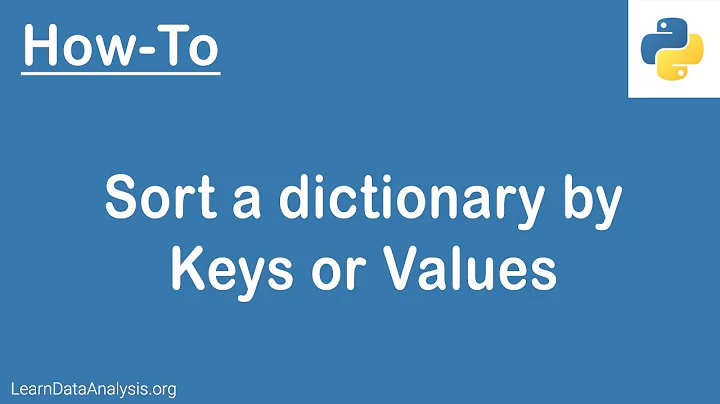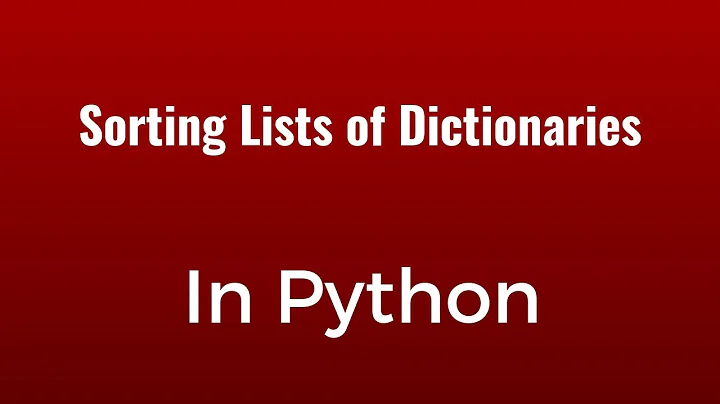Sorting dictionary using operator.itemgetter
Solution 1
In [6]: sorted(mydict.iteritems(), key=lambda (k,v): operator.itemgetter(1)(v))
Out[6]:
[('a2', ['e', 2]),
('a4', ['s', 2]),
('a3', ['h', 3]),
('a1', ['g', 6]),
('a6', ['y', 7]),
('a5', ['j', 9])]
The key parameter is always a function that is fed one item from the iterable (mydict.iteritems()) at a time. In this case, an item could be something like
('a2',['e',2])
So we need a function that can take ('a2',['e',2]) as input and return 2.
lambda (k,v): ... is an anonymous function which takes one argument -- a 2-tuple -- and unpacks it into k and v. So when the lambda function is applied to our item, k would be 'a2' and v would be ['e',2].
lambda (k,v): operator.itemgetter(1)(v) applied to our item thus returns
operator.itemgetter(1)(['e',2]), which "itemgets" the second item in ['e',2], which is 2.
Note that lambda (k,v): operator.itemgetter(1)(v) is not a good way to code in Python. As gnibbler points out, operator.itemgetter(1) is recomputed for each item. That's inefficient. The point of using operator.itemgetter(1) is to create a function that can be applied many times. You don't want to re-create the function each time. lambda (k,v): v[1] is more readable, and faster:
In [15]: %timeit sorted(mydict.iteritems(), key=lambda (k,v): v[1])
100000 loops, best of 3: 7.55 us per loop
In [16]: %timeit sorted(mydict.iteritems(), key=lambda (k,v): operator.itemgetter(1)(v))
100000 loops, best of 3: 11.2 us per loop
Solution 2
The answer is -- you can't. operator.itemgetter(i) returns a callable that returns the item i of its argument, that is
f = operator.itemgetter(i)
f(d) == d[i]
it will never return simething like d[i][j]. If you really want to do this in a purely functional style, you can write your own compose() function:
def compose(f, g):
return lambda *args: f(g(*args))
and use
sorted(mydict.iteritems(), key=compose(operator.itemgetter(1),
operator.itemgetter(1)))
Note that I did not recommend to do this :)
Solution 3
itemgetter doesn't support nesting ( although attrgetter does)
you'd need to flatten the dict like this
sorted(([k]+v for k,v in mydict.iteritems()), key=itemgetter(2))
Related videos on Youtube
user225312
Updated on November 25, 2020Comments
-
user225312 over 3 years
A question was asked here on SO, a few minutes ago, on sorting dictionary keys based on their values.
I just read about the
operator.itemgettermethod of sorting a few days back and decided to try that, but it doesn't seem to be working.Not that I have any problems with the answers presented to the questions, I just wanted to try this with
operator.itemgetter.So the dict was:
>>> mydict = { 'a1': ['g',6], 'a2': ['e',2], 'a3': ['h',3], 'a4': ['s',2], 'a5': ['j',9], 'a6': ['y',7] }I tried this:
>>> l = sorted(mydict.itervalues(), key=operator.itemgetter(1)) >>> l [['e', 2], ['s', 2], ['h', 3], ['g', 6], ['y', 7], ['j', 9]]And this works as I want it to. However, since I don't have the complete dictionary (
mydict.itervalues()), I tried this:>>> complete = sorted(mydict.iteritems(), key=operator.itemgetter(2))This doesn't work (as I expected it to).
So how do I sort the dict using
operator.itemgetterand callitemgetteron the nested key - value pair. -
user225312 over 13 yearsCan you please explain this:
operator.itemgetter(1)(v))? -
user225312 over 13 years
unutbuhas a solution, though it's not clear. We will wait for him to update it. -
Sven Marnach over 13 years@A A:
operator.itemgetter(1)(v)is equivalent tov[1]. You can replace just any occurrence ofa[b]withoperator.itemgetter(b)(a), but this is not how I did understand your question :) -
 John La Rooy over 13 yearsCreating an itemgetter is relatively expensive. This creates one for each key in the dict
John La Rooy over 13 yearsCreating an itemgetter is relatively expensive. This creates one for each key in the dict -
ezdazuzena over 10 yearsfor python3 use items instead of iteritems
-
Zelphir Kaltstahl about 6 yearsInvalid syntax anyway, because
lambdadoes not take the tuple. -
 Mateen Ulhaq over 5 yearsI think it would be valuable to put a disclaimer at the top lest the naive Google searcher unwittingly think's it's cool to use that
Mateen Ulhaq over 5 yearsI think it would be valuable to put a disclaimer at the top lest the naive Google searcher unwittingly think's it's cool to use that




